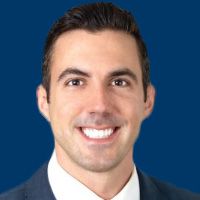Commentary
Video
Dr Jha on Community Accrual to the ECLIPSE Trial in Prostate Cancer
Author(s):
Gautam Jha, MD, discusses collaborative efforts between community and academic oncologists to accrue patients to the ECLIPSE trial.
Gautam Jha, MD, medical director, M Health Fairview Masonic Cancer Clinic and the Advanced Treatment Center at the M Health Fairview Clinics and Surgery Center—Minneapolis, chair, cancer committee, M Health Fairview Ridges Hospital, discusses the advantages of collaboration between community and academic oncologists to enroll patients to clinical trials, noting the efforts by the University of Minnesota and surrounding community cancer centers to accrue patients to the phase 3 ECLIPSE trial (NCT05204927).
This clinical trial evaluated the radioligand 177Lu-PSMA-I&T vs standard-of-care hormone therapy with abiraterone acetate (Zytiga) or enzalutamide (Xtandi) in patients with metastatic castration-resistant prostate cancer (mCRPC) who experienced progressive disease and received prior treatment with an androgen receptor–directed therapy.
The utilization of novel treatment modalities, specifically radioligands targeting prostate–specific membrane antigen (PSMA), represents another potential treatment path for patients with mCRPC, Jha begins. Notably, the targeted nature of this therapy limits toxicity, thereby enhancing patient acceptance and enthusiasm. Importantly, this treatment strategy delays the initiation of chemotherapy, offering patients a preferable alternative to conventional therapies, he adds.
The collaborative partnership between the University of Minnesota and community oncologists facilitated successful trial accrual, according to Jha. This collaboration addressed common patient needs across both settings, aligning with the shared goal of accessing cutting-edge research and minimizing logistical burdens for patients and their families, he explains.
Furthermore, community oncologists are often entrenched in conventional practices and overwhelmed with patient care responsibilities, presenting a challenge to clinical trial enrollment, Jha says. However, proactive engagement and outreach efforts by academic institutions to leverage existing professional networks can mitigate these barriers. Jha notes that his experience in leveraging local connections and relationships with neighboring oncologists illustrates the effectiveness of such collaborative approaches in enhancing trial accrual rates.
Bridging the gap between academic and community oncologists not only benefits patient access to innovative therapies but also fosters professional satisfaction among referring physicians, Jha continues. By offering cutting-edge treatments within their local communities, referring physicians retain patient continuity and contribute to advancing medical knowledge and therapeutic options, he concludes.









